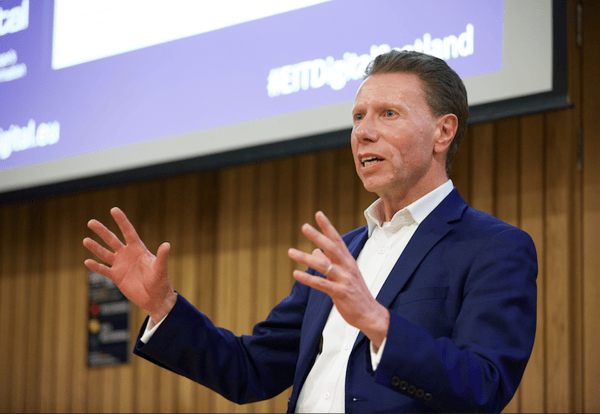Welcome to the Frictionless Finance Report, our monthly look at everything new in the world of Open Banking, FinTech, and consumer experience. If you’d like to receive this in your inbox, fill in the form at the bottom of the page. This month we examine the transition from Open Banking to Open Finance, the success of FinTech and tech in the UK, and how technology has come to be of central importance to UK banks.
Open Banking
DirectID CEO, James Varga, has a saying “Bank data is meaningless. It's what you do with it that counts.” His point here, is that the introduction of Open Banking has been a fantastic step forward for everyone from consumers, to banks, to tech companies – but as yet there has been little done with bank data that can truly demonstrate the value of bank data.
Broadening and widening Open Banking to a system of Open Finance is quickly gaining attention within the UK and beyond. Indeed, James wrote on the subject for an article in Bobsguide last year.
As we move into 2020, how Open Banking can be further caressed and nurtured into a system that can truly be called Open Finance will continue to generate coverage. In these first few weeks of 2020, we have seen articles in Finextra and Fintech Futures calling for further exploration of the theme.
FinTech Futures look at the subject from the viewpoint of asset and wealth management, an area not currently covered by Open Banking legislation. the article considers that to-date Open banking is only giving consumers a partial view of their finances. There are still large swathes, such as mortgages, wealth, pensions, credit agreements, that are out of scope of Open Banking. Bringing in additional components to Open Banking will give consumers a genuinely holistic view of their finances – including wealth management.
Because those accessing the services of wealth managers naturally tend to have a large volume of different accounts and providers, this move will be of particular benefit to them.
In Finextra, Roger Vincent also argues that Open Banking has not gone far enough, and right-now, is more stick than carrot. Indeed, as has been seen from Visa’s purchase of Plaid in the last few months, it is now incumbent on financial service firms to look to embrace Open Banking tech. Failure to do so could lead to them transforming into mere service providers.
Best of the rest in Open Banking:
? It’s one we’ve seen on a couple of occasions recently, but pleasing to see it gaining some traction - “can Open Banking assist mortgage brokers”? Yes, say Financial Reporter.
? A new report from Intuit Quickbooks reveals that despite its lack of name recognition, Open Banking could yet drive a boom in SME business.
Open Banking Abroad
Regular readers of these pages will not be surprised to see that the volume of news coming from abroad centres on the three countries in which there has been sustained coverage of Open Banking – the US, Canada and Australia. We are also pleased to see however, representation this month from Singapore. The city-state has been quietly preparing the groundwork for APIs and is ready to make them a central plank of the banking infrastructure.
United States
? American banks, primed by the emergence of PSD2 in Europe are locked in serious conversations on how to control the move from screen scraping to direct API access.
As we saw last month, some like JP Morgan have decided to go all in and ban screen scraping altogether, while others are taking a more modest approach. In recent months, the banking giant has expressed its concern over the use of screen scraping and is now moving to support API access. Other banks, however, are concerned about involving FinTech’s in their customer relationships. With little central guidance in the US banking sector, it is likely that groupings such as the Financial Data Exchange (FDX) will be crucial in facilitating the evolution from scraping to APIs.
In a hotly disputed article in Politico, the debate is confronted, to discuss the potential ramifications for banks, customers and FinTech’s.
Canada
? Barriers continue to be broken down in Canada, as the Canadian Government moves ever closer to implementing Open Banking. Except it won’t be ‘Open Banking.’
As per the Financial Post, a committee advising the government has directed that ‘Open Banking’ should be replaced with ‘consumer-directed finance.’
According to the committee the term is less confusing for consumers than Open Banking.
The Post report:
The report proposes the term “consumer-directed finance” be used instead of open banking, as it said the latter “is often misunderstood; as for some, it leaves the impression that their banking information would be laid out in the open, with little consideration for personal privacy rights.
The Financial Post last year reported on public-opinion polling done for the federal government that found none of the people being surveyed knew about open banking, or had heard of it at all. Furthermore, the polling found people disliked the term, as it made them imagine their information would be made public.
Singapore
? There has been praise for the Monetary Authority of Singapore (MAS) for ensuring that Singapore remains at the front of the Open Banking revolution in Asia. MAS has stated that open APIs in conjunction with the formation of new digital banking licenses will be key to future banking developments in the region.
News via Singapore Business Review and pymnts.com.
 Australia
Australia
? The Australian Consumer Data Rights, (CDR), which incorporates Open Banking, and is slated to go live on July 1st 2020, has been ratified by the Australian financial watchdog.
July will represent the second stage of the implementation as it will include all banks, not just the big four. Phase three is slated to go live from February 2022, and will include additional features such as overdrafts, mortgages, investments and business accounts.
News via Finextraand the Adviser Australia.
Finance
Over the last month, we’ve been fortunate to read a number of insightful articles on the future of finance and banking. From our reading so far, it’s clear that the intersection of banking and finance and technology will be a key driver in the field over the course of the next twelve months. Whether it be the rise of the Challenger banks, new digital banks from the incumbents, or new tech such as AI, RPA, voice tech or other impacting upon the sector, the ramifications are huge. This month, we’ve picked out three reports that deserve summary:
???Accentureoffer their top 10 trends in banking
??? Digital transformation platform MX have produced a report on the future of banking
???Tearsheethave summarised banks’ struggles at modernisation
Within the three reports it is easy to spot similar trends working through each. Unsurprisingly, the role and prominence of technology is central to both how investors and customers view the role of a bank.
With MX highlighting how consumers now feel comfortable using FinTechs for staples such as payments, the response from high-street banks is to innovate to develop new customer friendly products. However, as is noted is the Tearsheet breakdown, investors are 1) concerned about investments in new technology and 2) think that new innovation means “IT”. This leads to obvious problems in getting new innovative concepts off the ground.
However, friction for consumers is quickly disappearing, and with loyalty to a particular bank or provider all but dead, consumers are happy to scour the internet to find the best rates, or a provider that matches these values. To this end, banks digital engagement with their customers has become as important as their physical relationship.
Accenture also rightly note the importance that Open Banking will play within the industry this year, writing:
Expect the best banks to accept that vertically integrated banking is dead, and to use shared data to try to claim the advisory high ground, intermediating the offers of other firms for the benefit of their customers while also protecting their personal data.
Accenture’s report Top 10 Trends for 2020can be accessed here, and MX’s the Ultimate Guide to the Future of Bankingcan be accessed here.
Credit Strategy has produced a number of articles touching upon the soon to be introduced law to give those with substantial debts 60 days breathing room. The Treasury has signalled that it is willing to implement the reforms, which were proposed by the FCA. The FCA revealed that there are over 7m UK adults who are in persistent debt and have difficulties paying down their debts.
 Best of the rest in Finance
Best of the rest in Finance
✅ The fight to power Amazon’s financial services capabilities may well have been won by Goldman Sachs. Goldman’s, lest we forget, already powers Apple’s credit card.
✅ How do “fin” and “tech” come together to make FinTech? In the future will we even be talking about FinTech, or as illustrated by the Visa takeover of Plaid, will banks be powering their own tech? Chris Skinner discusses on his blog.
✅ We've written frequently on the UK Government’s commitment to continue providing access to cash. Now, local pilot schemes are being rolled out across the country.
Natalie Ceeney, Chair of the pilot programme said:
With the UK becoming an increasingly cashless society we need to make sure that digital payments work for everyone, but we also need to support communities who rely on cash, so that no-one gets left behind.
FinTech
The importance of the UK to the rise and prominence of FinTech has been well documented. London particularly, has been at the forefront in FinTech developments for the best part of the last decade. A slew of reporting this month has only further proven how well the UK competes against its rivals.
Importantly, while London has been the guiding light, and still hosts more FinTech’s than anywhere else, Fintech founders are now looking to other parts of the UK as suitable for launch. There are several reasons for this, including:
? The UK is relatively small, and London is no more than an hours flight from even the furthest airport
? The reputation of UK universities remains very high, with a well educated workforce available in all UK cities
? Office, salary and other associated costs are very often much lower in regional cities
? Regional agencies, aligned with local and devolved governments have done an excellent job of selling specific parts of the UK to an international audience
UK Tech News has taken the opportunity of highlighting the success of Birmingham as a tech hub, noting that in the last three months £2 billion of venture capital has poured into UK startups. They further report that investment into UK based tech firms between January and July of last year stood at $6.7 billion.
In similar vein, a new report from Whitecap Consulting has highlighted the Bristol and Bath region as a hotspot for Fintech startups.
It is perhaps the news that Scotland has been awarded formal accreditation as a FinTech cluster of excellence that is most impressive. The European Secretariat for Cluster Analysis examined 36 economic indicators before making the award. The news comes shortly after FinTech Scotland’s second birthday, in which it was announced that the number of FinTech’s in Scotland had grown 60% to 119. Shortly after news broke of the Fintech Cluster, it was announced that Chinese firm PolyDigi Tech will create 16 jobs in Edinburgh after receiving funding from Scottish Enterprise.
Stephen Ingledew, chief executive of FinTech Scotland, said:
We’re very proud of this cluster excellence recognition. It’s a symbolic flag we can fly, which will increase our reputation among firms and investors across Europe, USA and the Far East.
Scotland is increasingly being recognised as offering the innovation, skills, culture and expertise that global fintech enterprises and investors seek.

News via Daily Business Group, Digit, Scotsman, Scottish Government (press release), FutureScot and on PolyDigi Tech, Daily Business Group and Digit.
This has been put into wider context still by a new report from Innovate Finance which has examined the funding received by UK FinTech’s across the country. They state that investment into UK FinTech’s stood at $4.9 billion last year – the highest figure in Europe. The figure was over three times that received by German FinTech’s, and globally, the UK is now in second place, second only to the United States.
Charlotte Crosswell, CEO of Innovate Finance, said:
We are a world-leading fintech hub, and as the figures reveal, the epicentre of fintech in Europe – all of which is a testament to the fact that the UK is a leading destination to start and scale a fintech business.
News via City AM and the Trade News
Best of the rest in FinTech:
? Vilnius, the Lithuaniancapital, has become the biggest hub for European FinTech’s, now that the UK has left the EU.
? 25% of all the investment in the UK came from one source – Softbank. News via Quartz and Private Equity News.

DirectID News
The team at DirectID were delighted to release a glut of new content to our listeners, readers and watchers last month.
? This month we launched episode two of our podcast series, in conjunction with the Lending Standards Board. In episode 2, Liam Thomson of DirectID interviews Harry Hughes from the LSB and DirectID CEO, James Varga to discuss how the 2010s have changed everything in the world of finance, from both a regulatory and technological standpoint.
You can listen to the full podcast, here.
Our webinar series, first introduced last year, grew in popularity as the year progressed, and by popular demand, it’s back!
In the first of our webinars for this year, we were joined by Alan Steele. Alan has been working in the Collections and Recoveries space for over a decade, and was happy to share his thoughts on how Open Banking and bank data will irretrievably change the face of Collections and Recoveries.
You can listen to the full webinar, here.
? Our second webinar of the year has been pencilled in, and will be broadcast on Thursday 5th March. In this episode, we’ll be joined by Credit Risk specialist Chris O’Driscoll. As well as answering all your pain points on credit risk, Chris will be examining the full gamut of ways that bank data is already impacting upon credit risk decisioning.
? Registration for the second webinar will be opening very soon, so watch this space! In the interim, listen to our back catalogue of previous webinars, which you can find here. Also, follow DirectID on Crowdcast, our friendly webinar provider to be notified of all future webinars.
We continue to update our content, and have published a suite of new articles that we would encourage you to take some time with. New articles:
?Do the Risks Associated with Bank Data Make it Right for Your Firm by Kenny Pattie
?To Succeed, Open banking Requires All of Us. Here’s Why from James Varga
?11 predictions for the Evolution of Payments through the 2020s by Kenny Pattie
?8 Ways Banks can Increase Customer Lifetime Value by Embracing Digital by Kenny Pattie
That's all for this month. As always, if you’d like to input (and thanks to everyone who has!) into the Frictionless Finance Report, please drop us a note – frictionlessfinance@theidco.com. Let us know what your top article or piece of learning for the month was!
For all the news from DirectID, follow us across all of your favourite social channels - LinkedIn, YouTube and Twitter








